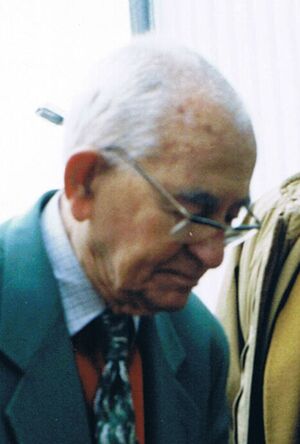Difference between revisions of "Louis Leprince-Ringuet"
(Added: employment, alma_mater, birth_date, birth_place, death_date, death_place, nationality.) |
(unstub) |
||
| (One intermediate revision by one other user not shown) | |||
| Line 2: | Line 2: | ||
|wikipedia=https://en.wikipedia.org/wiki/Louis_Leprince-Ringuet | |wikipedia=https://en.wikipedia.org/wiki/Louis_Leprince-Ringuet | ||
|amazon=https://www.amazon.com/s/ref=ntt_srch_drd_B00JOMHKJ4 | |amazon=https://www.amazon.com/s/ref=ntt_srch_drd_B00JOMHKJ4 | ||
| − | + | |image=Louis Leprince-Ringuet.jpg | |
| − | |image= | ||
|nationality=French | |nationality=French | ||
| − | |birth_date=1901 | + | |birth_date=27 March 1901 |
|birth_place=Alès, France | |birth_place=Alès, France | ||
| − | |death_date=2000 | + | |death_date=23 December 2000 |
|death_place=Paris, France | |death_place=Paris, France | ||
|constitutes=physicist, engineer, historian | |constitutes=physicist, engineer, historian | ||
| − | |alma_mater=École | + | |alma_mater==Collège Stanislas,École supérieure d'électricité,École polytechnique,Télécom Paris |
|employment= | |employment= | ||
| + | |description=French nuclear physicist and [[European Movement]] leader | ||
}} | }} | ||
| + | '''Louis Leprince-Ringuet''' was a [[France|French]] physicist, [[telecommunications]] engineer, essayist and historian of science. | ||
| + | |||
| + | When he attended the 1974 Bilderberg meeting, he was newly appointed president of the French section of the [[European Movement]]. | ||
| + | |||
| + | Leprince-Ringuet advocated strongly for the creation of the [[CERN|European Organization for Nuclear Research (CERN)]] and remained its indefatigable supporter. He was vice chair (1956–69) and chair (1964–66) of CERN’s scientific policy committee.<ref>https://cds.cern.ch/record/44713</ref> | ||
| + | |||
| + | ==Career== | ||
| + | From 1929, Louis Leprince-Ringuet worked with [[Maurice de Broglie]] in the X-ray physics laboratory. It was thanks to the latter - whom he would later qualify as a “spiritual father” - that he began to work on what would become his specialty, [[nuclear physics]]. He soon creates his own nuclear physics laboratory. | ||
| + | |||
| + | He taught physics at the [[École Polytechnique]] from [[1936]] to [[1969]] (succeeding [[Charles Fabry]]) and at the [[Collège de France]] from [[1959]] to [[1972]]. From [[1949]], he was a member of the French Academy of Sciences. | ||
| + | |||
| + | From 1951 to 1971 he was commissioner of atomic energy. His nuclear expertise would place him straight in the middle of the secret French-Israeli program to develop nuclear weapons. | ||
| + | |||
| + | He obtained numerous titles of recognition by his peers such as several prizes from the Academy of Sciences and the French Society of Physics ( Félix-Robin Prize 1942). He defined himself as an experimental physicist and attaches great importance to experimentation. | ||
| + | |||
| + | A practicing Catholic, he reflected a lot on the relationship between science and religion. From 1949, he was president of the Catholic Union of French Scientists. In 1961 he became a member of the [[Pontifical Academy of Sciences]]. | ||
| + | |||
| + | Louis Leprince-Ringuet was elected member of the [[Académie française]] in 1966. | ||
| + | |||
| + | His commitment to Europe led him to be president of the French Organization of the [[European Movement]] from 1974 to 1990. | ||
| + | |||
{{SMWDocs}} | {{SMWDocs}} | ||
==References== | ==References== | ||
{{reflist}} | {{reflist}} | ||
| − | |||
Latest revision as of 07:18, 11 April 2021
(physicist, engineer, historian) | |
|---|---|
 | |
| Born | 27 March 1901 Alès, France |
| Died | 23 December 2000 (Age 99) Paris, France |
| Nationality | French |
| Alma mater | , École supérieure d'électricité, École polytechnique, Télécom Paris |
French nuclear physicist and European Movement leader | |
Louis Leprince-Ringuet was a French physicist, telecommunications engineer, essayist and historian of science.
When he attended the 1974 Bilderberg meeting, he was newly appointed president of the French section of the European Movement.
Leprince-Ringuet advocated strongly for the creation of the European Organization for Nuclear Research (CERN) and remained its indefatigable supporter. He was vice chair (1956–69) and chair (1964–66) of CERN’s scientific policy committee.[1]
Career
From 1929, Louis Leprince-Ringuet worked with Maurice de Broglie in the X-ray physics laboratory. It was thanks to the latter - whom he would later qualify as a “spiritual father” - that he began to work on what would become his specialty, nuclear physics. He soon creates his own nuclear physics laboratory.
He taught physics at the École Polytechnique from 1936 to 1969 (succeeding Charles Fabry) and at the Collège de France from 1959 to 1972. From 1949, he was a member of the French Academy of Sciences.
From 1951 to 1971 he was commissioner of atomic energy. His nuclear expertise would place him straight in the middle of the secret French-Israeli program to develop nuclear weapons.
He obtained numerous titles of recognition by his peers such as several prizes from the Academy of Sciences and the French Society of Physics ( Félix-Robin Prize 1942). He defined himself as an experimental physicist and attaches great importance to experimentation.
A practicing Catholic, he reflected a lot on the relationship between science and religion. From 1949, he was president of the Catholic Union of French Scientists. In 1961 he became a member of the Pontifical Academy of Sciences.
Louis Leprince-Ringuet was elected member of the Académie française in 1966.
His commitment to Europe led him to be president of the French Organization of the European Movement from 1974 to 1990.
Event Participated in
| Event | Start | End | Location(s) | Description |
|---|---|---|---|---|
| Bilderberg/1974 | 19 April 1974 | 21 April 1974 | France Hotel Mont d' Arbois Megève | The 23rd Bilderberg, held in France |